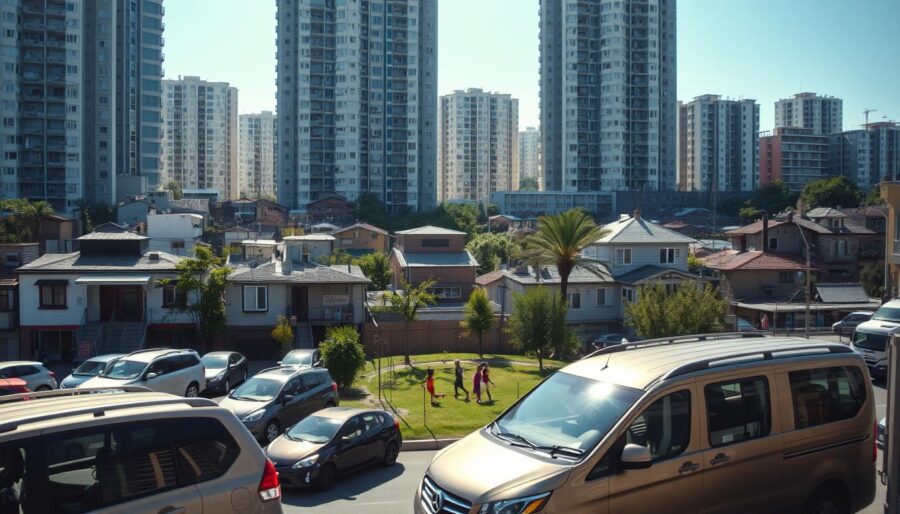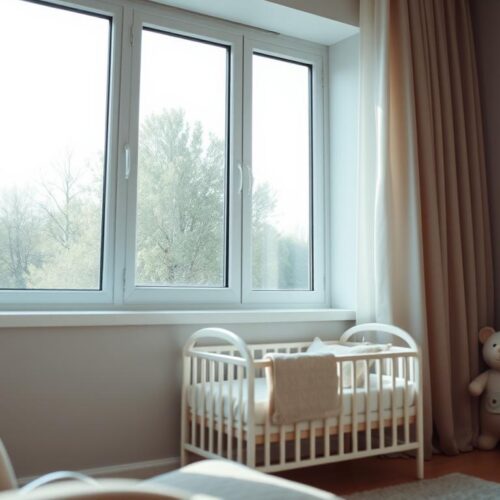Choosing a home for your family means considering the noise level around it. Living in loud places can hurt your family’s happiness. It can cause stress that affects how your family gets along. By picking a quiet place to live, you create a calm space that makes life better. This article talks about why it’s important to avoid noisy places when looking for a family home. It helps you find the most quiet areas for families.
Understanding the Impact of Noise Pollution on Families
Noisy places can be tough on families. Noise pollution in living areas makes stress and daily disruptions worse. It leads to poor sleep and hard times talking with each other. Studies show it can cause more anxiety and even higher blood pressure.
On the other hand, families in quiet spots have it better. Their homes are peaceful, making it easy to get along and feel well. Less noise means easier chats and better sleep. This boosts life quality for everyone.
Defining Noisy Areas and Their Characteristics
Noisy places make it hard for families looking for calm in their everyday lives. These areas often have a lot of background noise from different things. Things like cars, building work, buses, trains, and places for fun add to the noise that gets into homes. It’s important for families to know about these things when they choose where to live.
If you’re looking around for a place to live, keep an eye out for noises in the area. Here are some things that often make an area noisy:
- Traffic Noise: Busy streets mean ongoing noise, especially when there are a lot of cars.
- Construction: When buildings are being made, the work and machines used can be very loud.
- Public Transportation: Being near to where buses and trains are can bring a lot of noise.
- Entertainment Venues: Being close to places like bars, restaurants, or theaters can mean loud sounds.
Knowing the main causes of noise will help you make better choices for your family’s home. Choosing a quiet place to live can really make life better for you and your family.
Noisy Areas and Family Housing
Choosing a home in a loud area can really impact families. Being around constant noise can cause stress and hurt family life. It’s key to know how noise affects us when picking a good neighborhood for your family.
The Consequences of Living in Noisy Environments
Lots of noise can harm our health and happiness. Here are some common problems it can cause:
- Irritability: Non-stop noise can make everyone more stressed and snappy.
- Disrupted Sleep: Noise can break up a good night’s sleep, making everyone feel worse.
- Diminished Family Bonding: Loud sounds make it hard to talk and bond as a family.
Identifying Common Sources of Noise in Family Housing
Many things around the home can be noisy. Look out for:
- Neighboring Properties: Noise from next door can easily come into your home.
- Busy Roads: Living close to busy roads means dealing with the sound of traffic.
- Recreational Facilities: Places like parks and sports areas are great but can get loud, especially when they’re busy.
Why Noise Levels Matter When Choosing a Home
When picking a place to live, know the noise levels around it. It’s important. Noise isn’t just annoying; it can hurt your health if you hear it too much. Living in a quiet place helps keep you healthy, focused, and your family happy.
Effects of Noise on Health and Well-Being
Loud noise can make you feel stressed or anxious, which is bad for your health. Being around loud sounds a lot can make you more likely to get heart problems. It can also mess with your mind. Kids do better at school and feel happier when it’s quieter. So, picking a quiet area to live is a smart move.
Influence of Noise on Family Life and Activities
A lot of noise can mess up family time and make it hard to talk or relax together. A calm place lets your family get closer and helps kids be more creative. Noise can make it tough to study, which is frustrating. So, taking time to check out the noise where you might live is worth it. It helps make a peaceful home.
| Noise Level Category | Health Effect | Family Life Impact |
|---|---|---|
| Low Noise Levels | Reduced Stress | Enhanced Family Bonding |
| Moderate Noise Levels | Possible Distraction | Increased Difficulty in Communication |
| High Noise Levels | Increased Anxiety | Disruption of Family Activities |
Evaluating Family-Friendly Neighborhoods
Choosing where your family lives is very important. Look for places where kids can grow and play safely. Places with parks, community centers, and fun spots are great for family life. They should have safe places to walk and good playgrounds.
It’s nice when it’s quiet around your home. This helps everyone feel calm and happy. Think about how loud the area is. A place that’s peaceful yet lively is perfect for family time and rest.

Key Considerations When Assessing Quiet Living Options
Finding places to live that are quiet can make life better for families. This is especially true when these places are near important things like schools and parks. Families enjoy living close to schools and parks. It gives kids a chance to learn and play nearby.
This kind of environment is less noisy. It lets kids have fun and learn in peace. It’s great for striking a balance between getting smarter and having fun.
Proximity to Schools and Parks
How close you are to schools and parks matters a lot. Being near schools means it’s easier to get to class and after-school activities. Parks are great for fun, community events, and hanging out.
Living close to these places makes the neighborhood better. It’s enriching for everyone.
Types of Family Activities within Quiet Residential Areas
Quiet places are great for family time. Families can:
- Have picnics in the park
- Ride bikes or walk on trails
- Go to local events and fairs
- Play on playgrounds with their kids
In these areas, you’ll find less traffic and friendlier neighbors. This encourages kids to play outside. It helps families feel like they belong to a community.
Assessing Noise Disturbance in Residential Areas
Understanding noise disturbance is key to making good housing choices. Learning about how sound travels in buildings helps you know if noise could move between homes. This matters a lot for your family’s comfort.
Checking out the noise in areas you like is vital for a peaceful home. Talking to people who already live there gives you real insights. This helps you see if a place suits your way of living.
Understanding Acoustical Properties of Different Projects
Different homes manage sound in various ways. Things like how well a building blocks sound and the materials it’s made from affect noise levels. When picking a home, think about a few things:
- Wall thickness and material type
- Presence of double glazing in windows
- Flooring materials that absorb versus transmit sound
- Room layouts that influence sound flow
Consulting Neighbors on Typical Noise Levels
Talking to neighbors can give you a clear idea of noise levels. This chat helps you gauge noise issues in the area. Here are some things you might want to ask:
- What time of day is noise most prevalent?
- What types of noises are common?
- How loud is the noise, on a scale from 1 to 10?
- Are there times when the neighborhood is particularly quiet?
Finding Peaceful Neighborhoods for Families
Looking for peaceful places for families means checking many things that make a place quiet to live in. Starting with checking the community noise rules is a good step. Knowing the local rules can show you where there’s less noise. This greatly improves your family’s life.
Researching Community Noise Policies
Noise rules usually have limits on how loud sounds can be at certain times. These rules help keep the noise down, especially early in the morning or late at night. Looking into these rules lets you know if a neighborhood values a quiet life. You can find info on noise rules on local government sites or community boards.
Factors That Contribute to a Quiet Living Environment
Many things can make a neighborhood more peaceful. Important factors include:
- Layout of the Neighborhood: Streets designed well can cut down on noise by keeping traffic low.
- Green Spaces: Parks and gardens help quiet sounds and give a peaceful spot to relax.
- Community Engagement: Involved communities often promote a culture of respecting quietness with events and neighborhood watch.
Looking at these factors helps you figure out if a neighborhood is as quiet as you want for your family. Choosing peaceful neighborhoods means a better home for you and your loved ones.
Utilizing Tools and Resources for Noise Assessment
Today’s families get a lot from new noise measuring tech. Knowing the noise level in future living spots is key. With tools like apps and devices, you find out about noise in neighborhoods.
This info helps pick the best spot for your family’s peace.
Noise Measurement Apps and Devices
There are many noise-measuring apps and gadgets out there. They are easy to use and give exact noise numbers. This is essential for choosing the right home.
Here are some tools to know:
- Sound Meter App: Turns your phone into a noise level tracker.
- Decibel X: Offers live tracking of noise, ideal for spotting loud sounds.
- NoiseCapture: Made by experts to study noise pollution in areas.
- Professional Sound Level Meters: Like the Extech 407730, these give precise noise measures beyond what apps can.
Having the best tools for noise measurement helps you make smart house choices. It also raises awareness about noise pollution. These technologies let you find a calm place for your family.
| Tool/Device | Type | Features |
|---|---|---|
| Sound Meter App | Mobile Application | User-friendly interface, real-time readings |
| Decibel X | Mobile Application | Advanced monitoring, historical data |
| NoiseCapture | Mobile Application | Community-focused data collection |
| Extech 407730 | Device | High accuracy, professional-grade measurements |
Avoiding Noisy Zones in Urban vs. Suburban Settings
Choosing a place to live means thinking about noise. Cities have lots of fun places to go, like restaurants and theaters. But, they also have more noise because of cars and people out late.
Suburbs offer a quieter life. They’re great for families wanting to avoid city noise. Kids have more space to play without loud noises disturbing them.
When picking a place to live, think about what’s important for your family. Is it more important to have easy access to city amenities? Or do you prefer a quiet, calm neighborhood? Think about how much noise you’re okay with.

The Role of Building Design in Noise Reduction
Building design is key to reducing noise and making homes more comfortable. Families benefit from designs that reduce noise. By adding soundproofing, we can make life better in noisy areas.
Importance of Soundproofing Features
Soundproofing is a must-have in modern homes, not just an extra. Here are key ways to better sound insulation:
- Insulated Walls: Use of high-density materials can limit sound passing through walls.
- Acoustic Windows: Installing windows designed to reduce external noise provides quiet indoors.
- Flooring Choices: Carpets and pads contribute to sound absorption, reducing noise from foot traffic.
- Sealing Gaps: Proper sealing of windows and doors prevents sound leaks that could disrupt a peaceful environment.
Using these soundproofing features really helps, especially in apartments or crowded places. They make for a quieter, more peaceful home for families who love calm.
| Feature | Benefits | Impact on Noise Levels |
|---|---|---|
| Insulated Walls | Enhances thermal comfort and sound absorption | Reduces noise transmission significantly |
| Acoustic Windows | Minimizes outside noise intrusion | Blocks harmful urban noise |
| Carpeting | Improves comfort and absorbs sound | Decreases impact noise |
| Sealing | Prevents air leaks and sound escape | Keeps interior sound levels lower |
Strategies to Minimize Noise in Housing Choices
When selecting a home, it’s vital to think about how to control noise. Knowing about sound isolation ratings is key. These ratings tell you how good a property is at keeping out noise. Looking for homes with high ratings can make your living space quieter and more peaceful.
Seeking Properties with Better Sound Isolation Ratings
Homes differ in how well they block noise, based on design, materials, and how they’re built. Learning about Sound Transmission Class (STC) and Impact Insulation Class (IIC) helps you find a quiet home. STC rates how well walls and floors block sound. IIC rates how they handle noise from impacts.
Below is a table showing how these ratings affect noise control:
| Property Type | Typical STC Rating | Typical IIC Rating |
|---|---|---|
| Standard Apartment | 40-50 | 40-50 |
| Soundproof Apartment | 50-60 | 50-60 |
| Single-Family Home | 45-55 | 45-55 |
| Luxury Home with Soundproofing | 60+ | 60+ |
A property with good sound isolation ratings gives you comfort and peace. Look for homes that are made to resist noise. Choosing wisely can lead to a happier life at home.
Considering Future Developments in the Area
When looking for a new home, it’s crucial to think about the future. What developments are coming that could change your chosen neighborhood? Families should look into any upcoming urban projects. These could make things noisier, affecting the calm many seek.
Talking about local plans keeps you in the know. This way, you can understand how changes might impact where you live.
The Impact of Urban Development on Community Noise Levels
Urban growth often leads to more traffic and noise from construction. These noises can change how peaceful an area feels. It’s important to ask what kind of developments are coming. Whether they’re for shopping, new homes, or roads, they can change how noisy your neighborhood will be.
Knowing what’s planned for noise can help your family get ready for changes. It also helps you make smart choices about where to live.
Expert Tips for Families Moving to Noisy Areas
When families move to noisy areas, they should take steps to make their homes comfortable. One way is to choose homes with good noise insulation. Look for places with soundproof windows and thick walls to reduce outside noise.
Talking to people in the community before moving can also help. Ask neighbors about when it’s noisy and what causes the noise. This can help you know what to expect and how to prepare.
It’s smart to arrange your house carefully, too. Place bedrooms away from noisy streets or shared spaces. This helps everyone get a quieter sleep. Also, use landscaping or fences outside to block noise.
Another tip is to use white noise machines or materials that absorb sound in busy rooms. By considering these tips, you can enjoy both the excitement of your new area and the peace your family needs.
Common Mistakes Families Make When Choosing Housing
Choosing the right home can be tough for families, leading to big mistakes. One major mistake is not checking the neighborhood’s noise level. Understanding how noise impacts family life is crucial, especially in loud areas.
Another mistake is overlooking the community’s noise rules. Families might think their future home will be quiet, not thinking about local noise laws. Knowing these rules can save a lot of trouble later.
A peaceful home also needs good design to keep noises out. Ignoring soundproofing features can make daily life hard. So, families should search for homes with good soundproofing.
To dodge these errors, families must research well, check out homes at different times, and talk to the locals. Doing these steps can help families live more peacefully.
The Importance of Visiting During Different Times of the Day
When you’re looking for a new place for your family, it’s key to check out homes at different times. A daytime visit might not show you all the noise that comes at night. Things like local traffic, restaurants, or events can make evenings noisy.
Seeing a house during busy times and at night helps you really understand what it would be like to live there. This is the best way to get a feel for the place.
To really know about noise, find out when it’s loudest around the home. This information helps you choose the right home for your family’s happiness and way of life.
Conclusion
It’s key for families to choose housing that promises a peaceful setting. Noise can really disrupt our daily lives, sleep, and how we get along at home. By staying away from noisy areas, families can enjoy a calm life together.
When picking a place to live, it helps to look carefully at how noisy different areas might be. Knowing if a place is in the city or suburbs, and how it’s built, can help. Choosing homes with good soundproofing and knowing the local noise rules can make life quieter.
By taking steps early and looking closely at your options, you can find a peaceful home. This lets families grow in a loving, quiet space, turning the dream of peaceful living into reality.




